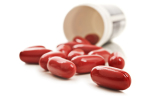|
2002/03/05, 09:10 PM
This is taken from a couple of articles from DiscoveryHealth.com. Hope it helps.......:
Chromium is a trace mineral. It is needed in very small amounts. Chromium supplementation may be useful in a number of health conditions.
Whole grains, lean meats, liver, eggs, cheese and brewer's yeast are good sources of chromium. The process of refining removes the chromium from grains. As a result, foods like white flour and white rice are low in chromium. Most Americans get only 50 to 100 micrograms (mcg) of chromium per day through diet.
Chromium works with insulin to help use blood sugar or glucose in the body. It combines with niacin to form Glucose Tolerance Factor, or GTF. GTF is a substance that works with insulin. Insulin is the hormone that takes glucose from blood and puts it into cells where it is needed for energy. Chromium helps maintain normal blood sugar levels. Optimal chromium intake reduces the amount of insulin needed to maintain blood sugar. Some studies report better blood sugar control for people with diabetes taking chromium supplementation. The function of chromium and insulin together also help start the making of proteins in the body. Optimal chromium intake may help protect against heart attacks in people that are at high risk, such as diabetics. Chromium seems to improve blood fat profiles such as cholesterol.
There are many chromium supplements available. They are marketed to many people from those with diabetes to those trying to lose weight. Chromium is available in supplements under the names chromium picolinate, chromium polynicotinate, chromium chloride and others. Supplements, like chromium picolinate, have gained a great deal of attention as a means to lose weight. Additional research is needed to confirm any results to date.
The chromium in supplements is found to be mostly safe and consuming harmful amounts from food is very unlikely. However, excess intake can hurt, rather than help, the use of insulin. The form of chromium found in foods is generally nontoxic. Extremely high amounts can cause toxicity and gastric irritation. High amounts or tissue accumulation of chromium can make insulin less effective. The greatest benefits of supplementation are seen in people who are severely deficient in the mineral. In this situation it has been shown to improve glucose and insulin function.
Some people are at risk for not getting enough chromium. These are people who eat a diet high in sugar and refined foods. Sugar increases chromium loss and refined foods are very low in chromium. Athletes may also have increased chromium loss through exercise. Chromium deficiency can resemble diabetes.
There is no Recommended Daily Allowance (RDA) for chromium. For adults, a safe and adequate amount is between 50 to 200 mcg per day. A mcg is a thousandth of a milligram; a very small amount. Even though chromium is needed in small amounts, it is a very important mineral in the body.
--------------
--JBennett
"I've up-ed my intensity.... now up yours!"
"Pain is only weakness leaving the body."
|




